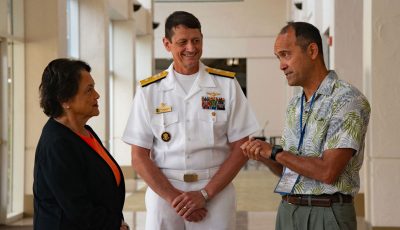Island resilience group is created
The just concluded 29th Pacific Islands Environmental Conference on Saipan inspired Gov. Ralph DLG Torres to create a climate change resilience group in the Commonwealth and he signed an executive directive to do just that.
With an audience full of environmentalists, Torres signed Executive Directive 2017-01, establishing the Commonwealth of the Northern Marianas Islands Resilience Working Group that will devise and implement a long-term plan to protect the Commonwealth’s environment against climate change and its impacts.
Torres said that climate change is a growing concern for every individual in the community.
“The CNMI relies on a clean and healthy environment for our livelihood, survival, and way of life. Our community, infrastructure, and ecosystems here in the CNMI may be adversely affected by even a small rise in sea level or changes in rainfall. We must continue to be proactive in adapting to the changes brought by climate change to protect our infrastructure, communities, and ecosystems, even as solutions to control carbon emissions are pursued,” Torres stated in the directive.
The resilience group will consist of representatives of various departments, offices, divisions, corporations, boards, and commissions of the Commonwealth government. The officials that are to be appointed for this working group would hold positions of authority in their designated offices.
Richard V. Salas will lead the working group as the CNMI climate change project coordinator.
Salas noted that the signing of the directive is timely.
“We cannot forget the fact that the Pacific region is especially vulnerable to the impacts of climate change due to its limited adaptive capacities. Planning for these impacts requires collaboration across many different sectors of the government, the private sector, and respective federal agencies. It is vital that we all work together to ensure that the livelihoods, the natural, and built environments can withstand the impacts of climate variability and change,” Salas said.
According to Salas, once they finalize a climate change plan, it will be available to policy makers to determine the best ways to alleviate impacts. Salas assured that the devised plan would be based on the best available information.



























